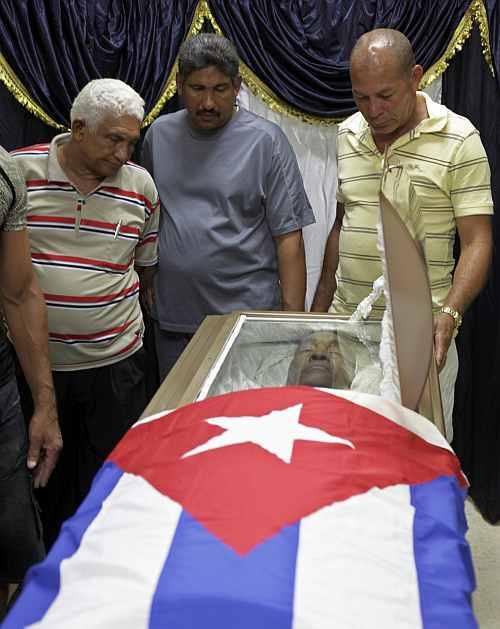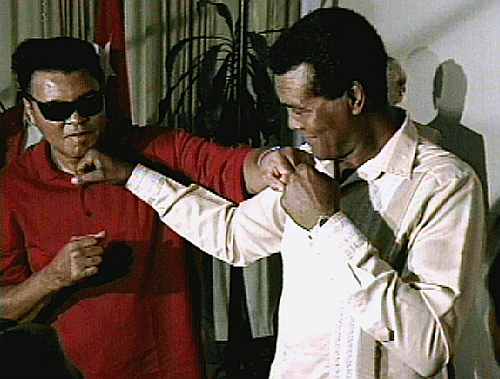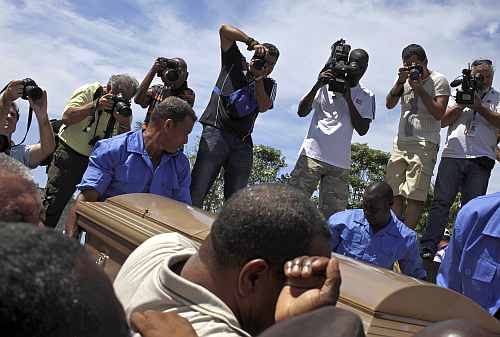Photographs: Reuters
Cuba said goodbye on Tuesday to heavyweight boxing great Teofilo Stevenson, who won three Olympic gold medals and became a symbol of communist pride when he refused to fight for money.
A day after he died of a heart attack at age 60, Stevenson was buried in Havana's historic Colon Cemetery, where about 200 people gave him a long round of applause and sang the Cuban national anthem.
Earlier, a steady stream of admirers and fellow athletes filed past his flag-draped casket in a noisy, crowded Havana funeral home to pay last respects to a boxer whose importance in Cuba transcended sports.
Atop the partially opened casket rested a pair of red boxing gloves. Around it were sprays of flowers from dignitaries, including Cuban revolutionary leader Fidel Castro, his younger brother President Raul Castro and Venezuelan President Hugo Chavez.
The big body of Stevenson, dressed in a suit and tie, appeared to barely fit in the metal coffin.
Won an Olympic gold medal in 1960
Image: Former boxing champion Muhammad Ali (L) playfully boxes with Cuban former amateur heavyweight Teofilo StevensoPhotographs: Reuters
At his peak, Stevenson was a symbol of the purity of amateur sport idealized by Fidel Castro, who banned professional athletics after taking power in Cuba's 1959 revolution. He was also a powerful propaganda tool for the island's communist system.
Tall, graceful and powerful, he was considered by many the equal of Muhammad Ali, the professional heavyweight boxing champion who himself won an Olympic gold medal in 1960, but he rejected a $5 million offer to fight him.
Stevenson, who came from humble beginnings in the eastern province of Las Tunas, strode on to the world boxing stage in the 1972 Munich Olympics, where at the age of 20 he battered a heavily favoured American Duane Bobick, en route to his first gold medal.
He followed with gold medals in 1976 in Montreal and 1980 in Moscow and was widely considered the greatest amateur fighter of his time.
He drew praise from Fidel Castro for qualities that went beyond boxing.
"Teofilo Stevenson deserves recognition by the Cuban people for his sporting success, which comes from his discipline, his dedication to the sport, his bravery and from his morality," the former leader once said.
A complete family man
Image: People carry the coffin of Cuban boxing great Teofilo Stevenson, during his funeral at Colon cemetery in HavanaPhotographs: Reuters
Fellow Cuban boxing great Felix Savon and Hungary's Lazlo Papp were the only other boxers to win three Olympic golds. Savon said Stevenson had left Cubans "an example of patriotism, solidarity, brotherhood, love for his flag and for his country."
Unlike many other Cuban athletes who have defected in search of professional success and money, Stevenson stayed at home and remained an amateur until his retirement in 1988.
"They offered him, offered him and offered him and he did not abandon his country," Savon said.
After he retired, Stevenson coached Cuban boxers and served as vice president of the Cuban Boxing Federation.
In January, doctors discovered a blood clot in an artery near his heart and put him in the hospital for two weeks for treatment. No details had been released about his death on Monday, except that he suffered a heart attack.





Comment
article